A Big Question: Can Dogs Have Mustard?
As a dog owner, you want to make sure that your furry friend stays healthy and happy at all times. One of the ways to do this is by understanding what kind of food is safe for them to consume.
While dogs can be picky eaters at times, they can also be quite adventurous when it comes to trying out new foods. One common question that many dog owners often ask is whether or not their dogs can have mustard. The short answer is no, dogs really shouldn’t eat mustard as a regular part of their diet.
Mustard is a condiment made from crushed mustard seeds and other ingredients such as vinegar, water, and salt. It’s commonly used in sandwiches, and salads, and as a flavoring agent in many dishes.

Why Understanding What Dogs Can and Cannot Eat Is Important
Before we dive into the topic of whether or not dogs can have mustard, let’s first talk about why it’s important to understand what our furry friends can and cannot eat. Dogs are not like humans when it comes to digestion. They have unique digestive systems that are sensitive to certain types of food.
Feeding your dog food that they cannot digest properly can lead to serious health problems such as bloating, constipation and diarrhea. In some cases, it could even be fatal.
In addition, certain types of human food may contain ingredients that are toxic for dogs. For example, chocolate is toxic for dogs because it contains a substance called theobromine which their bodies cannot metabolize effectively.
Understanding What Mustard Is Made Of
Now let’s get down to the nitty-gritty part of our discussion – what exactly is mustard made of? As mentioned earlier, mustard is made from crushed seeds mixed with vinegar or water along with other spices like turmeric or paprika.
While this may sound harmless enough for humans since we have different digestive systems compared to dogs; the same cannot be said for our furry friends. Dogs have more sensitive digestive systems that may react negatively to certain ingredients in mustard.
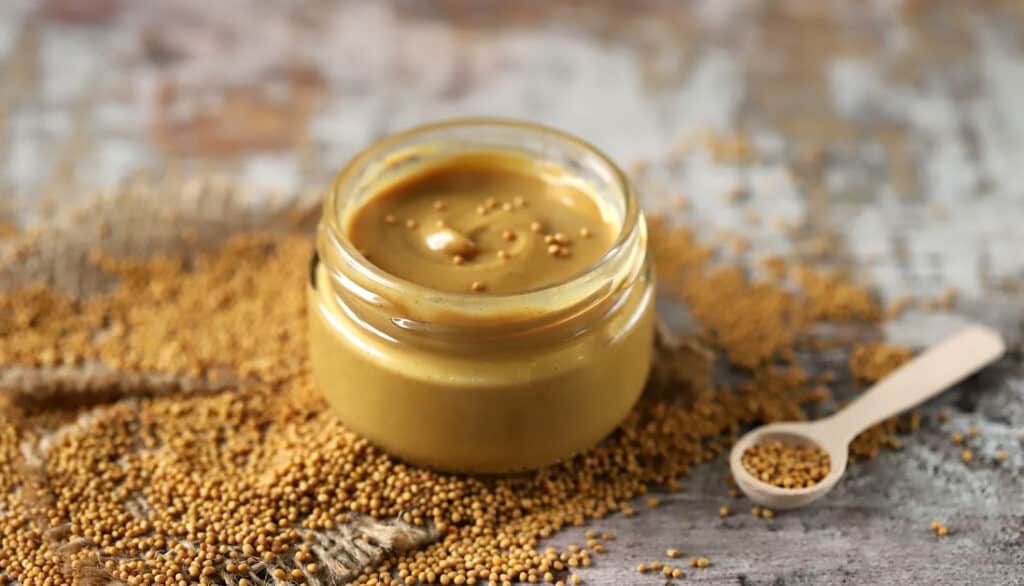
Can Dogs Have Mustard?
The answer is yes, but with caution. Small amounts of plain, unsweetened mustard are generally safe for dogs to consume. However, it’s important to note that this condiment should not be a regular part of your dog’s diet.
If you’re planning on giving your dog some mustard, it’s best to do so in moderation and as an occasional treat. Also, make sure that you don’t feed them any mustard with additional ingredients like onions or garlic. These can be toxic to dogs.
Potential Risks of Feeding Mustard to Dogs
Feeding your dog too much mustard or any type of food they are not used to can lead to negative side effects such as vomiting, diarrhea, and upset stomachs. Mustard contains vinegar which is acidic and can irritate their digestive system if consumed in large quantities.
Additionally, some types of mustard may contain xylitol which is a sugar substitute that is toxic for dogs. It’s always best to read the labels carefully before feeding your dog any human food.
Alternatives to Mustard for Flavoring Dog Food
If you’re looking for a way to add some flavor to your dog’s food without risking their health; there are plenty of substitute herbs and spices that are safe for them such as cinnamon or turmeric. You could also try making homemade condiments specifically designed for dogs. You can use ingredients like chicken broth or low-fat yogurt mixed with herbs like parsley or basil.
While small amounts of plain mustard may be safe for dogs; it’s important that we understand the potential risks involved when feeding our furry friends human foods. By being mindful about what we feed our pets; we can help ensure their health and happiness for years to come.
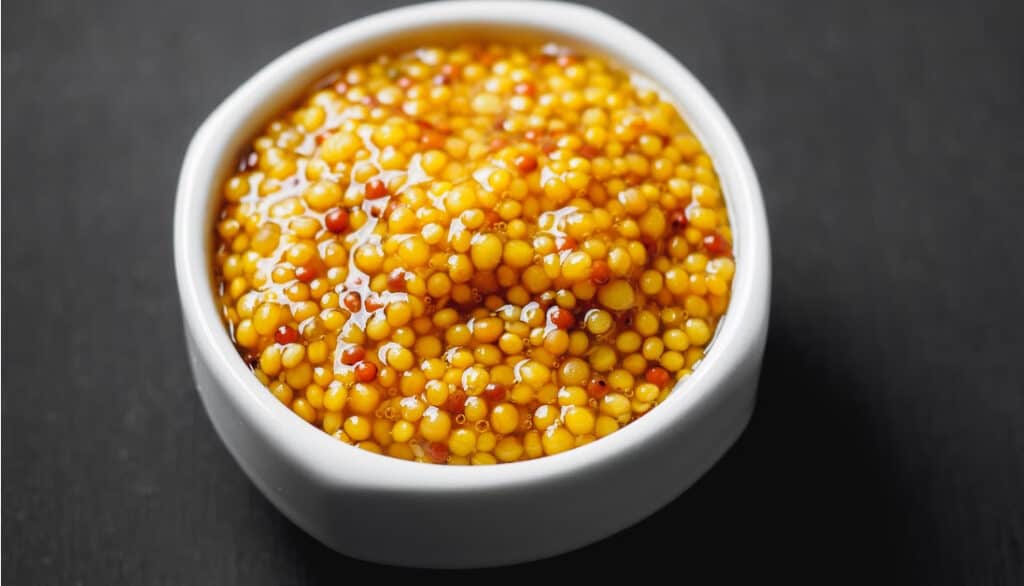
The Big Question: Can Dogs Have Mustard?
It’s a question that dog owners might find themselves asking. After all, mustard is a popular condiment in many households. But before we can answer this question, it’s important to understand what mustard is made of and how it affects dogs.
What Is Mustard Made Of?
Mustard is made from ground mustard seeds combined with vinegar or water and other flavorings such as salt, sugar, or various herbs and spices. There are many different types of mustard – from mild and sweet to hot and spicy – but they all contain these basic ingredients.
It’s worth noting that many commercial mustards contain additional ingredients that may not be safe for dogs to consume. For example, some varieties may contain onions or garlic, which can be toxic to dogs in large quantities.
Is Mustard Safe for Dogs to Consume?
The short answer is that it depends on the individual dog and the amount of mustard consumed. In small amounts, plain yellow mustard (without any added ingredients) is generally considered safe for dogs to eat.
However, it’s important to keep in mind that some dogs may have an allergic reaction if they consume even a small amount of mustard. Symptoms of an allergic reaction can range from mild (itchy skin) to severe (difficulty breathing).
Additionally, ingesting large amounts of mustard could potentially cause gastrointestinal issues such as vomiting or diarrhea. This is particularly true if the mustard contains added flavorings like salt or sugar.

How Much Mustard Can Dogs Eat Safely?
As with most things related to pet health and safety, the answer varies based on individual circumstances. A general rule of thumb is that plain yellow mustard should only be given to dogs in small amounts as an occasional treat. If you’re unsure about whether or not your dog should have any mustard, it’s always best to err on the side of caution and avoid giving it to them altogether.
Conclusion: Should You Feed Your Dog Mustard?
While mustard can be a tasty addition to human meals, it’s important to remember that dogs have different dietary needs and restrictions. If you’re considering giving your dog some mustard – even plain yellow mustard. It’s crucial to do so in moderation and with caution. If you’re looking for safe ways to add flavor to your dog’s meals, there are many pet-friendly herbs and spices that can be used instead.
And if you really want to give your furry friend something special, there are plenty of homemade dog-friendly condiment recipes available online. Remember: Your dog’s health should always come first, so when in doubt, it’s best to consult with a veterinarian before introducing any new foods.
Potential Risks of Feeding Mustard to Dogs
Possible Allergic Reactions
Just like humans, dogs can also have allergies. Mustard contains a variety of ingredients that can cause allergic reactions for some dogs.
Symptoms of an allergic reaction include itching, swelling, hives, vomiting, and diarrhea. If your dog has never had mustard before and you’re considering giving them some, it’s best to start with a small amount and monitor them closely for any signs of an allergic reaction.

Negative Effects on Digestion and Gastrointestinal Health
Dogs have sensitive digestive systems, and feeding them mustard can cause gastrointestinal upset. Mustard is acidic which means it can irritate their stomach lining leading to vomiting, diarrhea or even gastric ulcers in severe cases.
The high sodium content in mustard can also lead to dehydration especially if the dog does not drink enough water after consumption. Furthermore, some people add sugar or artificial sweeteners to their mustard which could be harmful to your dog’s health.
Other Potential Risks of Feeding Dogs Mustard
In addition to the risks above , feeding your dog large amounts of mustard can lead to other potential issues such as obesity due to high-fat content in some varieties. Moreover, feeding spicy mustards could irritate their mouths leading them not wanting to eat any food because it causes pain/ discomfort.
What To Do If Your Dog Eats Mustard?
If you suspect that your dog has eaten a significant amount of mustard or shows any signs of an allergic reaction call your veterinarian immediately. They may advise you on whether or not further medical attention is necessary depending on how much they consumed and what symptoms they’re showing.
It’s never safe just go ahead and feed your furry friend human food without researching the ingredients first. Mustard can pose several risks and negative effects on your dog’s health.
It’s best to avoid feeding them mustard altogether or at least limit their consumption. Always read the label of anything you give your dog, and when in doubt, consult with a veterinarian for advice on what foods are safe and healthy for them to eat.
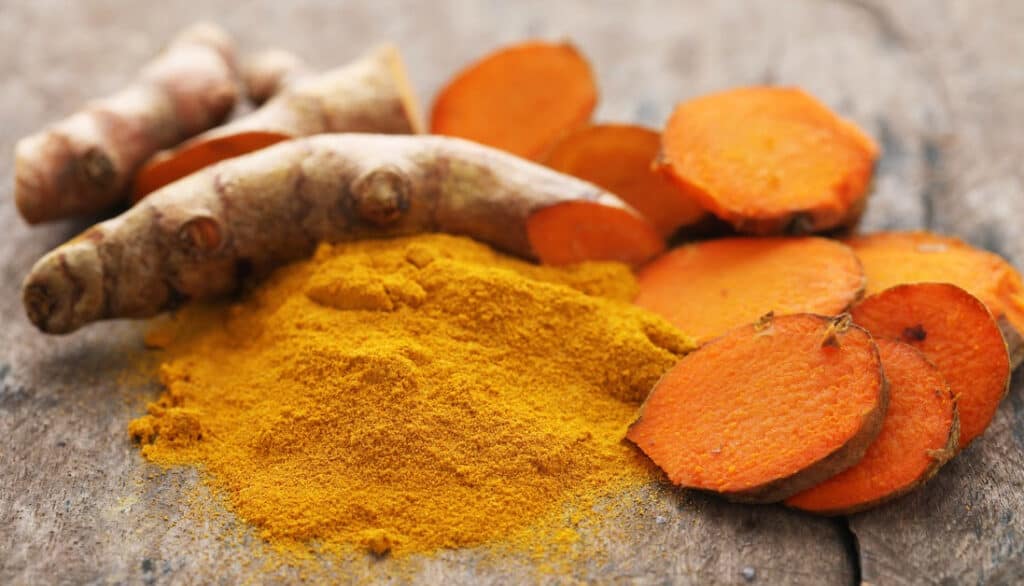
Alternatives to Mustard for Flavoring Dog Food
When it comes to spicing up your dog’s food, there are plenty of safe and tasty options that won’t harm their health. While mustard may seem like a quick and easy condiment, it’s always better to err on the side of caution when it comes to your furry friend’s diet.
One great alternative to mustard is turmeric. This spice is not only safe for dogs, but also boasts several health benefits.
It has natural anti-inflammatory properties which can help reduce joint pain and inflammation in dogs with arthritis. Turmeric can also aid in digestion and help prevent some types of cancer.
Another option is parsley, which can freshen your dog’s breath while also providing a mild flavor boost. Parsley is rich in antioxidants and vitamins A and C, making it a healthy addition to any canine diet.
If you want to add a little bit of sweetness to your dog’s food without using sugar-laden condiments like ketchup or barbecue sauce, try using cinnamon instead. This spice can regulate blood sugar levels while also adding a cozy warmth to their meal.
Rosemary is another excellent choice for flavoring dog food. It has antibacterial properties that can aid in digestion while also providing an earthy taste that many dogs enjoy.
Safe Herbs and Spices That Can Be Used Instead
While some herbs and spices are toxic for dogs (such as nutmeg), there are plenty of safe options that you can use as an alternative to mustard or other potentially harmful condiments. Basil is a great herb choice for adding freshness without overwhelming flavor.
It contains several essential vitamins and minerals such as vitamin K and iron which promote strong bones in dogs. Dill is another popular herb option that provides both taste and aroma without being too overpowering.
Dogs tend to love the smell of dill because it has a distinctive, aromatic scent. It’s also high in vitamins A and C which are crucial for maintaining good vision and a healthy immune system.
If you want to add some heat to your dog’s food without using mustard, try cayenne pepper. This spice can help boost your dog’s metabolism while also providing antimicrobial and pain-relieving benefits.
Oregano is a versatile herb that can add a pizza-like flavor to your dog’s food. It has antibacterial properties that can help fight off infections, making it an excellent choice for dogs who suffer from frequent UTIs or bacterial skin irritations.
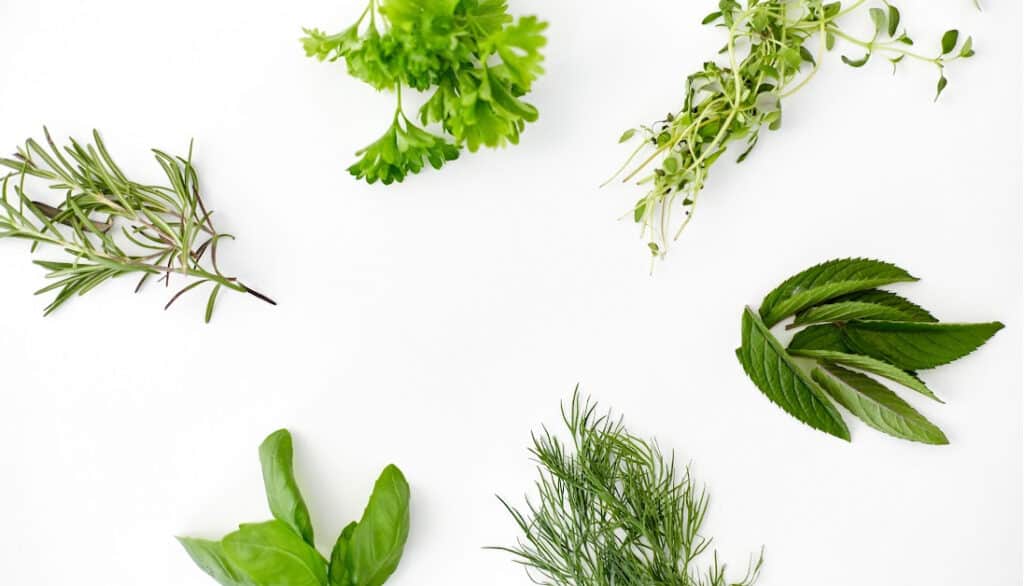
Homemade Dog-Friendly Condiments
If you’re looking for a fun DIY project that will let you customize your dog’s meals exactly how they like them, consider making homemade condiments! One easy recipe is peanut butter sauce which can be used as a dip for veggies or drizzled over kibble.
Simply mix natural peanut butter with some low-sodium chicken broth until it reaches the desired consistency. Some dogs may prefer sweeter nut butters like almond or cashew so feel free to experiment with different flavors!
Apple Cider Vinegar Dressing
Another homemade option is apple cider vinegar dressing which can be used as a marinade for meat or added in small amounts to salads or pasta dishes. Mix together:
- 1/4 cup of apple cider vinegar
- 1/4 cup of olive oil
- 1 tsp of honey (optional) in a jar and shake well before using.
Try making some sweet potato fries as an alternative to traditional potato chips! Simply slice up sweet potatoes into thin strips and bake in the oven at 400 degrees F for about 20-25 minutes until crispy.
Your pup will love munching on these tasty treats while also getting plenty of fiber and vitamins A and C. There are many alternatives to mustard when it comes to spicing up your dog’s food.
By using safe herbs and spices or making homemade condiments, you can customize their meals while also ensuring their health and happiness. Always consult with a veterinarian before introducing any new foods to your dog’s diet to ensure their safety.
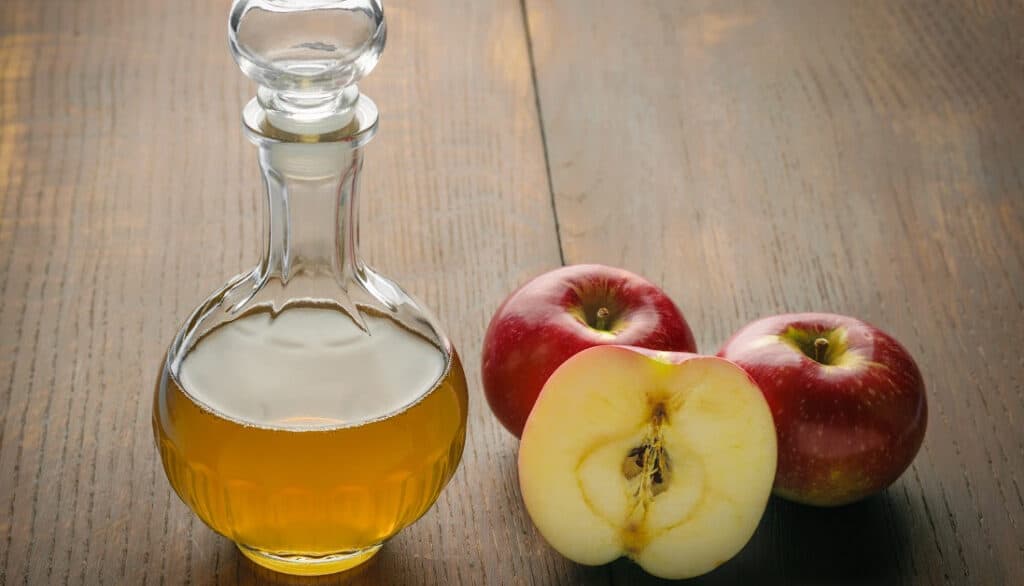
Recap of Main Points
After careful analysis and research, we can conclude that mustard is not suitable for dogs. Mustard contains various ingredients that can be harmful to our furry friend’s health.
Consumption of even a small amount of mustard can cause digestive issues, abdominal pain, and diarrhea. As dog owners, it is essential to understand the importance of balanced nutrition for our pets.
Dogs have different nutritional needs than humans, and feeding them human foods like mustard can lead to serious health issues. Furthermore, it’s crucial to be aware of the ingredients in commercial dog food.
Some dog foods contain hidden amounts of mustard and other spices that could harm your pet’s health. If you’re ever unsure about whether or not a particular food item is safe for your pet, consult with your veterinarian before giving it to your furry friend.

Emphasis on the Importance of Being Mindful About What We Feed Our Furry Friends
As responsible pet owners, we must take great care in what we feed our furry friends. It may be tempting to give them table scraps or leftover human food as treats, but this can be dangerous if not thoroughly researched beforehand.
Feeding dogs human food can lead to obesity and other health problems such as pancreatitis or liver disease. It’s always best to stick with commercially available dog food products that are designed specifically for their nutritional needs.
Moreover, being mindful about what we feed our pets also means monitoring their portion sizes regularly. Overfeeding dogs can lead to obesity and significant health problems which will require medical attention – this could burden us financially as well as cause undue stress on the animal.
Feeding our furry friends requires responsibility and careful attention towards their dietary needs – just like how we would approach any human member of our family! Let us keep these points in mind when deciding on what type and quantity of food items should be given to them.
